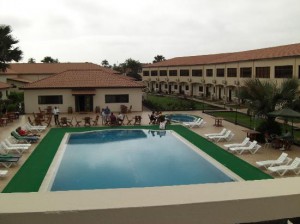Tripoli 8th March 2012:
The Gambian High Court has ordered the handover to Libya of previously frozen assets, belonging to the Libyan African . . .[restrict]Investment Company (LAIC), including two hotels and an amusement park. The position of other Qaddafi-era investments remains unclear.
The Gambia had frozen the LAIC assets in April 2011 in compliance with UN sanctions imposed on the Qaddafi regime. The court’s judgement now transfers control of these assets, the value of which was not given, to the NTC. Among them are the five-star Jerma Beach Hotel with 60 rooms and 19 villas and the four-star 200-room Laico Atlantic hotel in the capital Banjul. A third property, the Dream Park amusement park was built for $2 million and opened in 2008.

The Gambian High Court judgement did not include other Libyan assets in the country. These are known to include the local operations of the Sahelo-Saharienne Bank for Investment and Commerce, BSIC (Gambia Ltd).
BSIC was hailed in 2008 as the first investment bank to set up in the Gambia, Headquartered in Tripoli, the bank then had affiliate operations in Benin, Burkina Faso, Chad, Libya, Mali, Senegal, Sudan, Togo and a bank training centre in Mali. The whole bank had a capital of $320 million of which The Gambia had subscribed some $15 million or five percent of the equity. It is not yet clear if the NTC has also recovered control of the BSIC assets in The Gambia.
Despite the Gambia’s autocratic president Yahya Jammeh once enjoying close relations with Muammar Qaddafi, even saying that he was inspired by the Green Book, in February 2011 the country was the very first in Africa to recognise the Libyan rebels, at a time when the African Union was still trying to support the collapsing regime.
Calling for Qaddafi to step down, the Gambian government deplored the massive loss of life and said that Qaddafi had ignored warnings of unrest. It also called the Libya dictator a racist, because of his crackdown on the passage of African immigrants through Libya and his insistence that any passport that did not include Arabic script would not be eligible for a visa.
Yet though Gambian passports carry no Arabic translation, several thousand Gambians had been working in Libya. In March 2011, as the fighting increased, around 300 of these people were repatriated in two flights to Banjul.
The defection of a close political ally must have been a great shock to Qaddafi, who visited the country for three days in July 2009 and was feted as “King of African Traditional Kings”.
Only days before President Jammeh announced his support for the Libyan rebels, Libya’s then ambassador, Dr Ali Mohammad Dukaly was in the north of the country visiting Libyan-funded agricultural projects, attending the inauguration of a new mosque built with Libyan money and announcing a twinning between the Gambian town of Saaba and Sebha here in Libya.
Questioned about his decision to ditch the Libyan dictator, Jammeh, who rules his own country with an iron fist, told a BBC reporter: “ Yes I was very close to Qaddafi and I was very far away from him towards the end.” The Gambia went to to establish full diplomatic ties with the NTC last August.
[/restrict]







